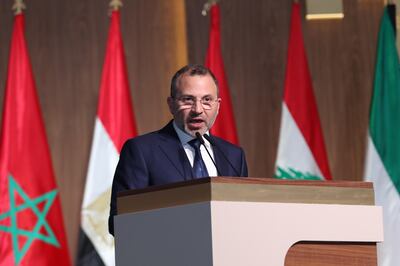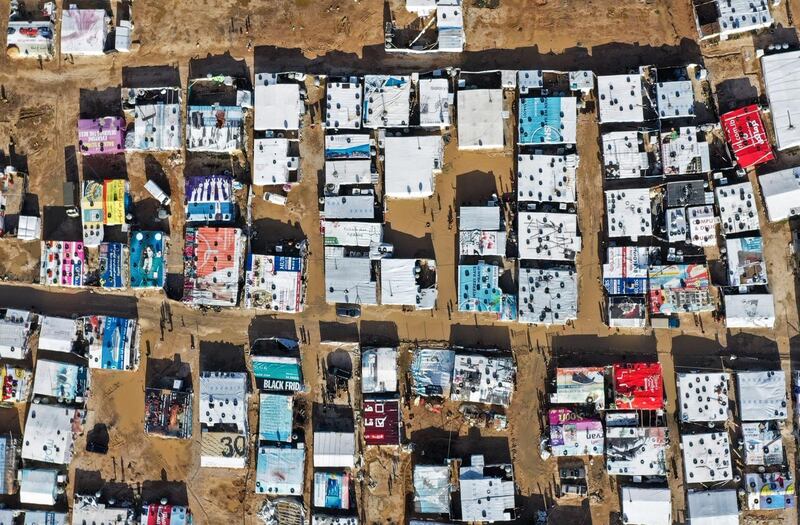Arab League countries agreed on a controversial statement mentioning that refugees be “encouraged” to return to their home country at the end of a two-day summit in Beirut on Sunday afternoon.
A joint statement was published and read by Lebanese foreign minister Gebran Bassil who called on the international community to foster “favourable conditions for return” by providing aid in their home country.
This means that returnees should have access to "security, shelter, nutrition and education", Mr Bassil told The National as he left the summit. "If they want to live in a tent in their country, they should receive the same as when they lived in a tent in Lebanon", he said.
Another statement tackling the broader 29 items on the summit's agenda was published, including free trade in the region, unemployment and the status of Jerusalem and the Kuwaiti initiative to create a $200 million (Dh734.5m) fund for investments in technology.
Lebanon has been intensely lobbying delegates attending the fourth Arab Economic and Social Development Summit to encourage the return of refugees, arguing that its weak economy and infrastructure cannot continue shouldering the burden of more than a million displaced Syrian people.
However, many countries, particularly the Gulf states, were hesitant to encourage refugees to return in the absence of a political solution to the Syrian conflict. After eight years of war, Syrian President Bashar Al Assad has regained control of most of the country, although fighting continues.
“This statement represents a victory for Lebanon” and a “gesture of solidarity” from Arab countries, Mr Bassil said.

Wording regarding refugee issues is particularly sensitive in Lebanon, which has a fraught history with Palestinian refugees. Their arrival en masse after the creation of the state of Israel precipitated Lebanon’s civil war from 1975 to 1990, and the country still hosts about 175,000 Palestinians with very little possibility of return.
Another controversial word was “voluntary”, which Mr Bassil opposed, and was not included in the final statement.
“It is true that we disagree with many on what “voluntary” means but we do not intend to force [refugees] to return”, he said. “What we mean is that if conditions are ripe for a safe and dignified return in good living conditions, and that a refugee decides to stay in his host country anyway, then he should lose his refugee status.”
During the second half of last year, more than 80,000 Syrian refugees living in Lebanon voluntarily returned to Syria in co-ordination with Lebanese authorities, said General Security – a branch of Lebanese intelligence that oversees these returns.
The UNHCR, which provides aid to refugees, was not able to confirm General Security's figures when it spoke to The National back in December, saying it was still checking numbers. Representatives from the UNHCR are present during departures but do not take part in their organisation. The UN agency has said its access to returnees in Syria is still limited.
______________
Read more:
Lebanon fails to attract high-level turnout for Arab economic summit
Syria’s shadow hovers over Arab League summit in Lebanon
Assad’s allies in Lebanon are pushing for Syria's return to the Arab League
______________
The Lebanese Foreign Ministry’s relation with the UNHCR is tense. Last summer, Mr Bassil accused it of discouraging the return of refugees and temporarily froze the renewal of work permits for international UNHCR staff. The UNHCR denied the accusation, arguing that it simply assists refugees with administrative procedures should they wish to return.
Lebanon had high hopes that a Russian initiative would accelerate refugee return, though it yielded few concrete results up to now. “It encouraged [refugees] a bit but then it was countered by other measures”, Mr Bassil said.
The US and Europe have refused to help finance these returns unless a political solution to the conflict is found.
In what seemed to be a snub to Lebanon, most Arab heads of state failed to attend the meeting. In his speech, Lebanese president Michel Aoun regretted seeing “empty seats” and recognised that “obstacles were stronger” than his country’s efforts.
Libya boycotted the event after a Lebanese party burnt the Libyan flag and Syria was not invited as its membership of the Arab League was frozen in 2011.
Saudi Arabia’s finance minister, Mohammed Al Jadaan, suggested that the Arab Economic and Social Development summit should be incorporated into the Arab League’s annual meeting, which would mean that the issues addressed in Beirut would be tackled again in Tunis in a few months.






